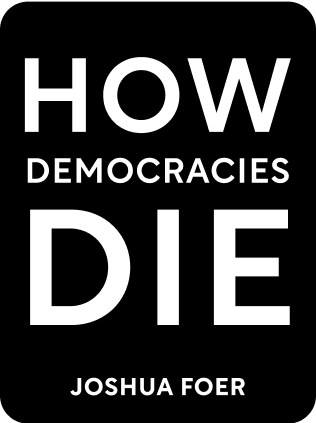

This article is an excerpt from the Shortform book guide to "How Democracies Die" by Steven Levitsky and Daniel Ziblatt. Shortform has the world's best summaries and analyses of books you should be reading.
Like this article? Sign up for a free trial here .
What causes constitutional hardball? What happens when one side of a political system breaks the unwritten democratic norms to secure a partisan advantage over its opponent side?
In their book How Democracies Die, authors Levitsky and Ziblatt argue that when one party secures a short-term partisan advantage by breaking unwritten democratic norms, the other party is likely to retaliate. These tit-for-tat dynamics create a so-called constitutional hardball that erodes democratic values of mutual toleration and institutional forbearance.
Here is how breaking the unwritten democratic norms to secure a partisan advantage jeopardizes democracy.
Mutual Toleration and Institutional Forbearance
The two main democratic norms Levitsky and Ziblatt highlight are mutual toleration and institutional forbearance. The authors define mutual toleration as accepting the legitimacy of one’s political opponents and acknowledging their right to govern, as long as they win in free and fair elections—regardless of ideological differences.
The second norm Levitsky and Ziblatt identify is institutional forbearance. This is the unwritten rule by which political actors agree not to weaponize their control of institutions to marginalize their opponents. For example, the majority party in the legislature might technically have the legal authority to uniformly and unequivocally block the judicial nominations of a president of the opposite party. But doing so would not only hamper the functioning of the judiciary, but be a violation of the norm of institutional forbearance. This could lead to a tit-for-tat cycle of retaliation—resulting in the ultimate destruction of democracy.
Constitutional Hardball
When one side in a political system decides to abandon unwritten norms to secure some short-term partisan advantage, the other side often feels it has little choice but to respond in kind. This set of practices is known as constitutional hardball—when politicians abandon restraint and abuse their institutional prerogatives to maximize their advantage over their opponents.
Tushnet identified two examples of such constitutional hardball from recent American history. The first episode was the highly unusual use of the filibuster (a parliamentary procedure to indefinitely prolong debate on a bill) by the minority Senate Democrats in 2002-03 to block Republican President George W. Bush’s federal judicial appointments. Tushnet argues that, while this behavior did not violate any law, it was nonetheless a breach of longstanding norms and customs within the Senate, dictating that a minority party ought not to abuse parliamentary procedures to obstruct the majority.
Another example Tushnet cites is the 2003 redistricting of Texas’s state legislative and congressional districts by the Republican-dominated state legislature. While state legislatures do have the right to redraw political boundaries, they usually do so immediately following the decennial census. The timing of the 2003 redistricting was highly unusual in that it occurred out of cycle, between the 2000 and 2010 censuses.
The new district lines were also drawn so as to maximize partisan advantage for the Republicans at the state and federal levels. In response to this episode of norm-breaking, Democrats in the state legislature responded with their own violation of political norms—by literally fleeing the state so as to deny the majority Republicans a quorum and temporarily prevent a vote on the redistricting plan from taking place. Ultimately, however, enough of the holdout Democrats returned to the legislature, which created a quorum that allowed the plan to pass.

———End of Preview———
Like what you just read? Read the rest of the world's best book summary and analysis of Steven Levitsky and Daniel Ziblatt's "How Democracies Die" at Shortform .
Here's what you'll find in our full How Democracies Die summary :
- How shared norms are essential for preserving democracy
- Why the Trump presidency threatened those shared norms
- Why democracy goes beyond individual leaders and parties and must be a shared enterprise among committed individuals






